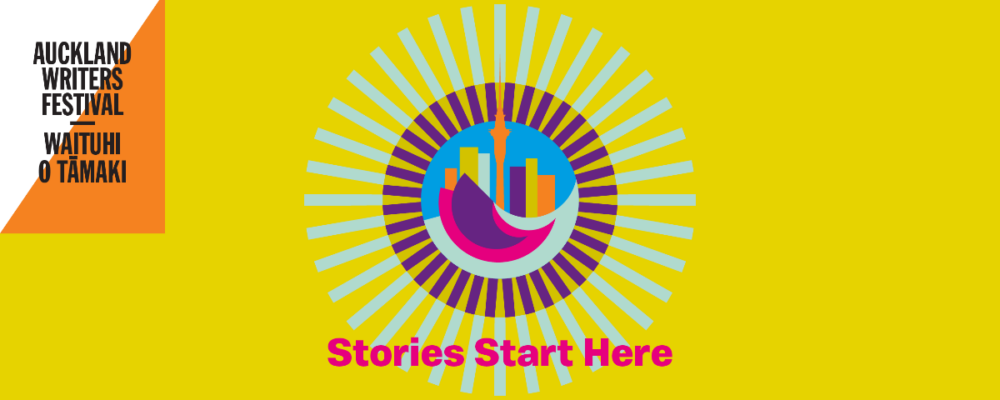Auckland Writers Festival 2025: 'Stories (Un)told'
An insider looks into Auckland city's largest festival for writers, readers and all things literary.

AWF is the largest annual literary festival in New Zealand since 1999. It hosts around 200 public events each year featuring guest local and international writers.
Unsettling Fictions
"Unsettling Fictions" might not be everyone’s cup of tea, but the full house for Mariana Enriquez and Kirsty Gunn—moderated by Lee Murray—suggested otherwise. Their candid, lively conversation was a refreshing break from the usual #BookTok favourites—romance and fantasy novels (to each their own, of course.)
The audience included fans from all over the world, including Argentinian readers familiar with the original Spanish edition of Enriquez’s short story collection ‘A Sunny Day for Shady People’. It was fascinating to hear about the nuances between the English translation and the original text. One of the most illuminating parts (pun intended) was how both authors powerfully championed the horror genre and the subversive power of the short story. The charismatically defiant pair challenged the dominance of the 'novel' in today’s publishing world, especially the frequently unchecked assumption that longer texts are more serious or sophisticated. Mariana Enriquez boldly resisted this notion, highlighting the legacy of South American writers who elevated the short story long before it became a hallmark of speculative literature.
Kirsty Gunn, the celebrated Scottish novelist and literary academic, drew on her scholarly insights and shared treasured wisdom from her peers. She reminded us of Plato’s warnings about the "dangerous" poets exiled from the city—feared for their power to disrupt social order. Gunn, however, praised literature’s rebellious streak, poignantly affirming, “Literature and writing are here to resist.”
While certainly not unique to the panel, one of the most exhilarating moments was each author reading excerpts from their work, captivating the audience with deeply unnerving prose. Enriquez’s piece shone a light on sexual assault and the enduring myths surrounding victimhood. Her writing, while masterfully crafted, never shied away from sharp, incisive commentary.
I found myself laughing out loud during several points in their conversation, as the authors seamlessly transitioned between topics like the commodification of storytelling, the unprecedented pressures on 21st-century writers, and the courage needed to face the darkness of modern life head-on. This brought to mind Ursula K. Le Guin’s ‘The Ones Who Walk Away from Omelas’, a story about the damning price of collective happiness. Are we doing the same when we pressure horror writers to trade unsettling truths for fleeting stories of joy and hope? The world may seem bleaker than ever, but if we continue to favour tidy redemptive arcs over reality, aren’t we just burying our heads in the sand? For this reader, the answer is clear—I'm choosing to look directly into the light.
Japan's Trailblazer: Asako Yuzuki
Another festival favourite was Asako Yuzuki’s best-selling novel ‘Butter’, which explores sexism, feminism, and patriarchal norms in Japan. Set in Tokyo, the novel follows a reporter’s obsessive quest to uncover the truth about a notorious female serial killer whose victims are seduced by her divine cooking. Despite its official debut in Asia, ‘Butter’ captivated readers globally with its razor-sharp prose and sinister culinary intrigue.
Yuzuki herself is charmingly modest. She admitted that she once believed her publisher’s doubts about her talent, never imagining anyone would want to read her work. "Life is worth living," I thought as an emboldened audience member leapt onstage to snap a group selfie with Yuzuki—and the entire auditorium applauded. With respect to her publisher, Auckland respectfully disagrees!
The 2024 Booker Prize Winner: Samantha Harvey
Not to be missed was the extended session with 2024 Booker Prize winner Samantha Harvey, discussing her novel ‘Orbital’. The slim, 136-page book draws readers in with lyrical prose and a profound sense of shared human connection—reminding us of our innate smallness in the vast cosmos. In a world increasingly divided by polarising politics and culture wars, Harvey’s work gently underscores that we are, first and foremost, citizens of this tiny blue planet.
In conversation with moderator Kate De Goldi, Harvey unpacked the novel’s unusual structure: each chapter told from the perspective of a different astronaut or cosmonaut aboard the International Space Station. From Chie grieving her mother to Anton mourning a loveless marriage, each character lingers in your memory despite their brief appearances.
Harvey sheepishly confessed that the inspiration for the book came from her husband’s brazen writing prompt—one she initially dismissed. “Don’t be ridiculous,” she muttered at the time. And yet, there she stood, Booker Prize in hand. She also shared amusing behind-the-scenes stories about the award ceremony, including a grandiose (yet seemingly never-ending) banquet without alcohol— “just in case you ended up winning!” Despite her soft-spoken demeanour, Harvey exuded quiet confidence and authenticity. An absolute joy to watch.
The Book Factory
I’ve always appreciated the festival’s kaupapa of nurturing future writers. Outside in Aotea Square, creators Marcus McShane and 5ever Books set up an interactive pop-up publishing station. For anyone wanting to write, edit, and publish a book in one day—this was the place to be. With industrial staplers, vintage typewriters, and expert guidance from volunteers, festivalgoers embraced the joy of creation.
After some gentle coaching, my clumsy attempts at manoeuvring the typewriter ribbon were met with endearing smiles. Tick, tick, tick. Fellow writers remarked on the tactile satisfaction of the using typewriter keys. Writing often feels like a solitary act, but this space exuded pure warmth—sunlight, shared murmurs, and the soft rhythm of keys composing a musical medley.
I couldn’t help but grin at the beaming wide-eyed 13-year-old boy next to me, watched attentively by his curious mother as he pondered a title for our group’s zine. “Impetus?” I offered hopefully. “Impetus!” he exclaimed, scribbling the word in bold lettering across the front cover. I knew his mother was smiling behind him without needing to look. Later, I presented our book to fellow festivalgoers, toasting everyone who bravely committed their words to paper that day. There was something healing in the spontaneity of it all—creating art without worrying about perfection, just free and honest self-expression. The final cherry on top was knowing that all the DIY books would be donated to the Auckland Central City Library’s public zine collection afterwards.
It might be the first time I’ve ever longed for more "factory" work—but if The Book Factory returns next year, I’ll be first in line.
And even if it doesn’t, it’s still a story worth telling.
Craacum would like to extend our deepest gratitude to Auckland Writers Festival Waituhi o Tāmaki for generously sponsoring our attendance this year.





